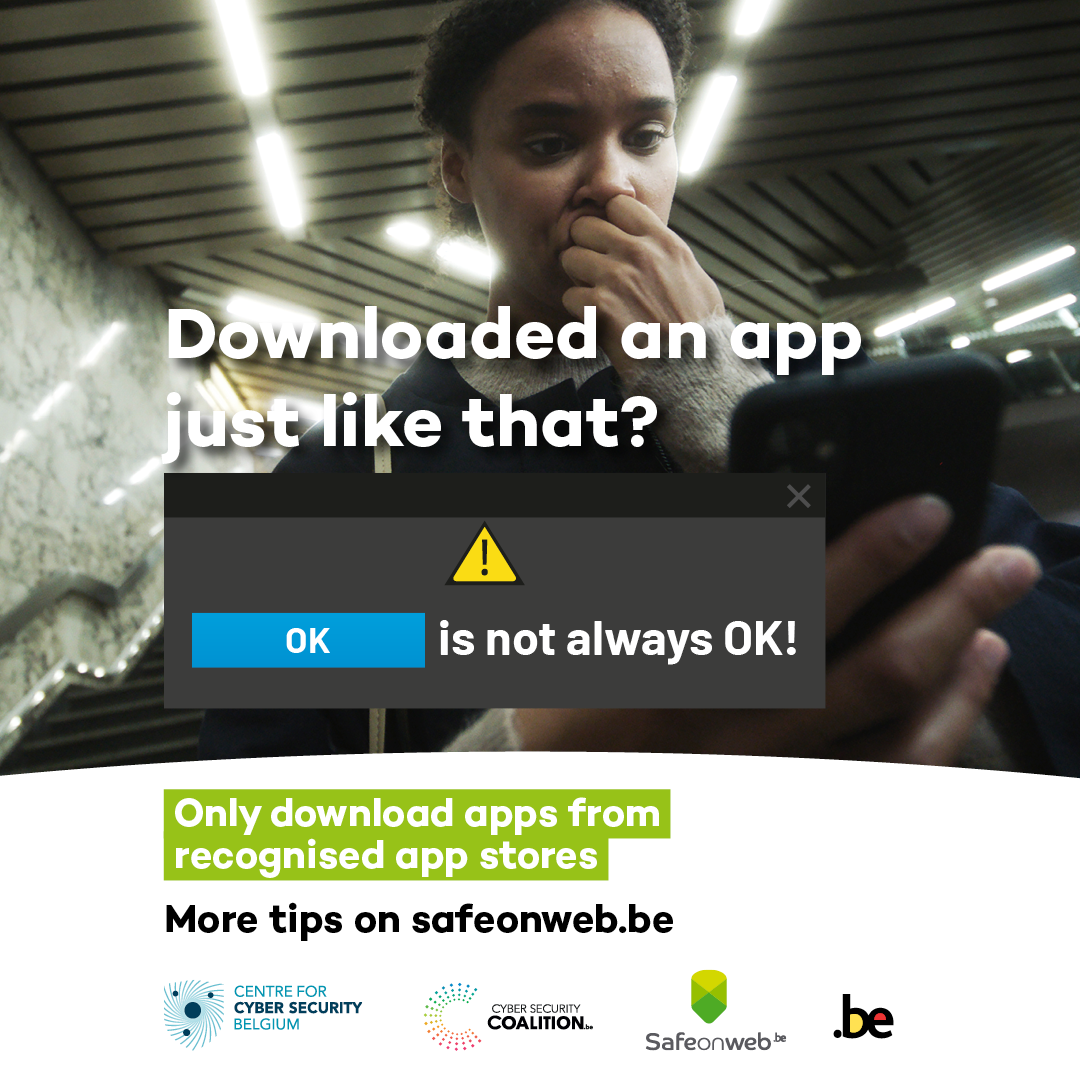OK is not always OK! First check, then click.
Oops! You have accidentally installed a suspicious app. Now what?
Picture this: you leave for work and when you get there you discover that you have forgotten your smartphone at home. Nowadays, many people get the creeps from such a scenario. After all, we are increasingly connected to our smartphone. As our trust in our smartphone grows, our critical eye fades. Enter: cybercriminals.
Cybercriminals are eagerly capitalising on
increased smartphone use, with the result that smartphone users are ever more
the targets of phishing, viruses, malware, ... October 2022 is cyber security
month, time to reflect on the smartphone’s potential dangers - lest our close
friend become a dangerous enemy.
In 2021, more than 11,000 smartphone users were caught out by cybercriminals. For this data breach, the cybercriminals deployed mobile malware. In other words, they designed special software for mobile devices with the goal of gaining access to your private data. The name of this mobile malware will probably ring a bell: the FluBot virus.
The FluBot virus caused one of the biggest cyber attacks to hit the modern Internet user. In no time, the virus infected more than 11,000 smartphones after users inattentively downloaded an unsafe application. The virus appropriated all contact details and continued its journey to all contacts on the infected smartphone.
In total, a daily average of 2 million messages were detected and blocked by operators between September 6 and 13, 2021 (Figures BIPT, 2021). Eventually, a large-scale police action in 2022 put a stop to FluBot. While this virus is history, other viruses are always ready to attack.
How can you outsmart cybercriminals? We are happy to share some tips to keep your smartphone close.
What can we learn from this incident?
Download apps only from the official app store
Prevention is better than cure. Through one simple principle, you can outsmart hackers: download apps only from the official app stores (Google Play, App Store) or through official vendors (LG, Samsung, SONY, Amazon, ...). Google and Apple check their apps for malware and thus offer a higher security guarantee than other vendors. Never download an app from an unfamiliar source. Chances are you will install a dangerous app or even a virus.
OK is not always OK!
First check, then click. In fact, clicking OK may have very unpleasant consequences. Be very cautious when you receive an email or text message in which they try to convince you to download an app. You will most likely be redirected to a less secure app store, increasing the chances of a virus. Do you receive a warning that you want to install an untrustworthy app? Then immediately cancel its download. In short, always use your head when clicking.
Be up-to-date
Do you get a notification to perform an update? Do this as soon as possible. In addition, restart your smartphone on a regular basis in order to install some updates automatically. This is because every app has its vulnerabilities, through which cybercriminals try to enter. Those software bugs are always being discovered and fixed. So to protect your device, you need to run the latest update.
How can we help you?
By training your employees during a cyber security training. They are cautioned against the dangers of opening emails and text messages, using social media and setting passwords. After the training, they should have mastered the proper reflex when receiving a suspicious email or phone.
Learning points

Change communication: without strategy, no support
A major restructuring at an international food company caused turmoil in the workplace. Hundreds of jobs were at risk, which deeply affected the employees. Barely a month later,...

How a missed incident report led to a major recall
A consumer finds a piece of plastic in one of your products. What at first presented as an isolated case, turned out to be a tell-tale sign for a bigger issue. Several people re...

Food Fraud: What if your product unintentionally contains banned substances?
A banned substance ends up in your product through a raw material. The consequences are widespread: various products must be recalled, consumers are worried, and the reputation ...






